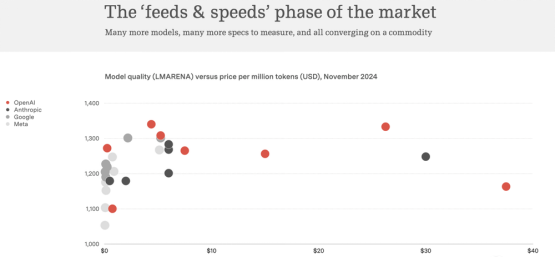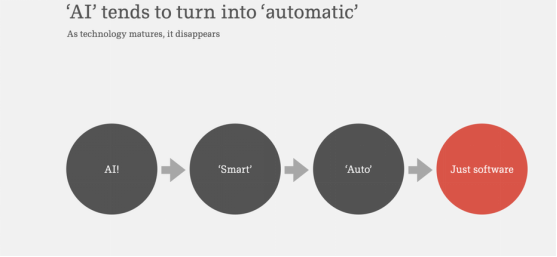The Dawn of a New Era in Artificial Intelligence: Future AI Models Will Iterate Weekly

Recently, I watched an inspiring talk by Dr. Qi Zhang, Microsoft's Corporate Vice President, about the future development of AI, as well as an annual observation speech titled "AI Eats the World" by Benedict Evans, a well-known independent analyst and former partner at top venture capital firm a16z. As someone who has worked in the AI field for many years, their insights have provided me with a new understanding of AI development. Today, I want to share several thought-provoking points from these two talks.
Artificial Intelligence is Experiencing a Qualitative Leap
Do you remember the shock when we first started using ChatGPT last year? That may have just been the beginning. Dr. Qi Zhang pointed out that the current development of AI has far exceeded the simple dialogue systems of the past. From GPT-3 to GPT-4, models have not only made leaps in scale but, more importantly, have seen qualitative improvements in comprehension and creativity. AI is reshaping industries at an unprecedented speed, fundamentally changing how people acquire knowledge, accumulate experience, and perceive the world, while also redefining human-computer interaction modes and habits. This evolution presents new challenges and demands for global governance and international cooperation.

In this context, we see models advancing in two directions: "bigger" and "smaller." On the one hand, large models are expanding in scale, continually pushing the boundaries of AI capabilities, demonstrating powerful generality, and promoting innovative solutions to complex tasks. On the other hand, small base models trained with high-quality data and fine-tuned with techniques like distillation can achieve performances comparable to large models in specific domains and tasks, with significant advantages in performance and power consumption. These developments greatly expand the application possibilities of language models.
A simple example: Current AI can understand complex multi-step instructions and adjust responses based on context. It's like transforming from a student who only parrots textbook answers into an expert capable of comprehensive understanding. The future of AI lies not only in stronger computational and reasoning capabilities but also in the enhancement of all-around intelligence. It will exhibit higher intelligence, emotional intelligence, and practical intelligence, along with excellent memory and learning abilities.
Breakthrough Advancements in Cost Efficiency
Evans discussed how rapid iteration and cost reduction of AI models will be key factors driving market development. It took Microsoft about 20 years to reach a market value of $150 billion, while OpenAI achieved an estimated valuation of nearly $160 billion in less than two years, indicating unprecedented adoption speeds for new AI technologies in the industry. OpenAI has reduced model training costs by 90% through technical optimizations. Meta and Apple are accelerating the popularization and diversification of AI applications through strategies such as open-source and edge computing. He predicts that future AI models will iterate every few weeks, driving the continuous introduction of more efficient models in the industry.

Honestly, many of us (myself included) were concerned about the high costs of AI. But the data Evans shared was enlightening. With algorithm optimization and hardware innovation, the training and usage costs of AI are rapidly declining. What does this mean? It means we might be closer to the large-scale application of AI than we imagined.
Transition from "AI" to "Software Agents"
I found this perspective particularly interesting. Dr. Qi Zhang believes that current AI can no longer be simply regarded as a program but is evolving into genuine "intelligent agents." They are starting to exhibit:
- The ability for active learning
- Adaptive decision-making abilities
- Goal-directed behavioral patterns
Initially, AI attracted attention with its impressive performance; then, it evolved into "smart" functionalities like intelligent recommendations, smart formatting, and intelligent summarization; further, it developed into "automated" functionalities capable of automatic error correction and formatting; ultimately, it will become an integral part of daily life, blending into people's work and life like ordinary software.
Think about it—doesn't this signify a shift from being a tool user to an intelligent assistant that can accompany, deeply understand, and proactively support people over time? Beyond AI itself, it has profound impacts on fundamental sciences. From discovering new materials to accelerating chemical synthesis and biopharmaceutical research, AI is significantly shortening the cycle of scientific exploration, helping researchers efficiently process massive data and validate critical hypotheses. As generative AI gradually transitions from being an innovative tool to a foundational technology for enterprise development, it is driving efficiency improvements and business transformations. Although there is still uncertainty about whether it can completely replace traditional workflows, AI's core position in business is becoming more established, becoming a driving force for industry development.
Copilot: A Real-World Example of AI Implementation
Microsoft's intelligent Copilot is a new-generation human-computer interaction interface that integrates large language models and search engine technologies, reshaping the work and lifestyle of users in over 220 countries and regions worldwide. As a significant product for Microsoft, Copilot's practical experience is especially noteworthy. Dr. Qi Zhang shared some usage data: In the programming domain, Copilot can automatically complete 40% of the code; in office scenarios, it can improve the efficiency of daily document processing by over 30%. This is not science fiction; it's a tangible increase in productivity.
Just as PCs and smartphones are gateways to the digital world, Copilot is becoming a bridge to the intelligent agent era. Through the Copilot+PC platform, it is driving a productivity revolution. In just the last quarter, Microsoft's AI solutions have gained over 100 new customer success stories across multiple industry sectors, showcasing Copilot's great potential. In the AI era, tools like Copilot are gradually becoming as accessible as water, electricity, and the internet.
XXAI is an outstanding Copilot AI tool that combines seven popular AI models, including GPT, Claude, Gemini, LIama3.2, Perplexity, Grok2, and DALLE3. It enables seamless switching between AI models in applications and web pages to provide instant support capabilities.
Conclusion
After listening to the speeches, my biggest takeaway is that AI development is faster than we imagined, but also more pragmatic than we thought. It is not the omnipotent robots from science fiction movies but an evolving intelligent assistant that is gradually changing our work and lifestyle. As an observer in the AI field, I believe the future key is not what AI can do, but how we can leverage AI to create value.
As Dr. Qi Zhang mentioned, AI development should serve humanity and promote social progress, which requires global collaboration and is a future that needs our joint participation.
So, what are your thoughts on the future of AI?